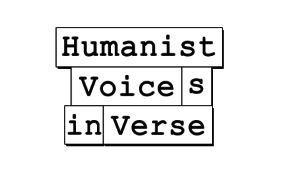Humanist Voices in Verse

April is National Poetry Month, established by the Academy of American Poets in 1996 to keep the love of poetry alive. In the April 15 New York Times magazine the poet laureate of the United States, Tracy K. Smith, says poetry can be a “rehumanizing force” and that she’s “interested in the way our voices sound when we dip below the decibel level of politics.”
“You want a poem to unsettle something,” Smith attests. “There’s a deep and interesting kind of troubling that poems do, which is to say: ‘This is what you think you’re certain of, and I’m going to show you how that’s not enough. There’s something more that might be even more rewarding if you’re willing to let go of what you already know.'”
This week we dip below the decibel level with poems by Krista Cox, DeMaris Gaunt, and Cynthia d’Este.
More Noble Truths
To begin, I Google “suffering
and acceptance” and visit Buddha
dot net. Only four truths
are noble—the how and why
of pain and its escape. Once,
when I couldn’t love a man, I threw
a bouquet of razorblades to
unmarry myself from that special
sting, the buzzing guts, a frantic
jerk of the steering wheel. The barbs
caught in my skin, of course, as all Lords
have predicted. They would tell me,
Cup what cuts you in your tentative
hands. You must love it. You must love every
fucking thing. This is why We gave
you senses. How noble, how true! How
burdensome: hollow myself into a home
for every vicious zealot. I hold
all these enemies closer than my hands
and welcome their whirling
supposedly without judgment. Supposedly
without whirling. I Google “selflessness
and isolation.” I detach. I detach.
I detach.
—Krista Cox
The Rules Now
There’s a difference
between what offends you
and what affects you,
we’re told. There’s a black
swastika on a blue-
gray transformer next to
the downtown park where I’ve seen
children who are too young
to feign color-
blindness playing less than
a football field away
from where a man’s smile
told me he knew
he would not
get caught.
—Krista Cox
Lunch With My Parents
We greet with hugs
and kisses and smiles
even though it’s only been a week
since we dined together
at another restaurant
in another part of town.
I dress for the occasion
in something like church clothes
because that’s what you do
when your parents are rich—
and they want to make sure
everyone knows who’s in control.
And you mustn’t forget
how much I love them—
though they’re on another team
who wants to build a wall
between abundance and need.
They struggle to understand
the equality of my love for others
while I remind them of a world
that doesn’t exist on Fox News.
Funny how well we get along
since we agree on nothing
except for the excellence
of the julep, the berry salad
and the turkey club
made divine by the avocados
which entered the country legally
and without the scrutiny
my father gives the bill
when it arrives on the silver tray.
I’ll offer to pay my fair share
but my mother will refuse
and wrap her right wing tightly
around me as if she still believes
that angels are keeping track
of all her good deeds—
which are always sincere,
even if they are limited to
a world so small she believes
it can still contain me.
—DeMaris Gaunt
A POEM TAKES THREE DAYS
A poem takes three days.
One day to snatch a piece of news
from the passing hem of a muse.
One day to pin its worth
to a page and trim it.
And one day to sit
and simply watch it
burn its groove.
Sooner than three days’
work is not enough.
It won’t ring true.
The other fifty years
lived and writ before
the three days?
Practice.
—Cynthia d’Este
